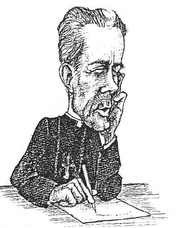
SEDEVACANTIST ANXIETY II
1 Either one recognizes the Conciliar Popes all the way (like the liberals – God forbid !), or one refuses them all the way (like the sedevacantists). To recognize them partly, and partly not, is to pick and choose what one will recognize, as did Luther, as do all heretics (in Greek, “choosers”). That is true if one picks and chooses according to one’s own personal choice, but it is not true if, like Archbishop Lefebvre, one judges in accordance with Catholic Tradition, which can be found in 2000 years’ worth of Church documents. In that case one is judging with 260 Popes against a mere six, but that does not prove the invalidity of these six.
2 But the Conciliar Popes have poisoned the Faith and endangered the eternal salvation of millions upon millions of Catholics. That is contrary to the Church’s indefectibility. In the Arian crisis of the 4th century, Pope Liberius endangered the Faith by condemning St Athanasius and by backing Arian bishops in the East. For a few moments the Church’s indefectibility went not through the Pope but through his seeming adversary. However that meant neither that Liberius was not Pope nor that Athanasius was Pope. Similarly the indefectibility of the Church today goes through the faithful followers of the line taken by Archbishop Lefebvre, but that need not mean that Paul VI was not Pope.
3 What the bishops of the world teach, in union with the Pope, is the Church’s Ordinary Universal Magisterium, which is infallible. Now for the last 50 years the world’s bishops in union with the Conciliar Popes have taught Conciliar nonsense. Therefore these Popes cannot have been true Popes. If the Church’s Ordinary Magisterium were to go outside Tradition, it would no longer be “Ordinary”, but most extraordinary, because Church doctrine admits of no novelties, the “Universal” being in time as well as space.Now Conciliar doctrine goes way outside Tradition (e.g. religious liberty and ecumenism). Therefore doctrine proper to the Council does not come under the Ordinary Universal Magisterium, and it cannot serve to prove that the Conciliar Popes were not Popes.
4 Modernism is “the synthesis of all heresies”(Pius X). But the Conciliar Popes have all been “public and manifest” modernists, i.e. heretics of such a kind as St Robert Bellarmine declared cannot be members of the Church, let alone its head. See last week’s “Comments”. Things were much more clear, or “public and manifest”, in Bellarmine’s day, than they are amidst today’s confusion of minds and hearts.The objective heresy of the Conciliar Popes (i.e. what they say) is public and manifest, but not their subjective or formal heresy (i.e. their conscious and resolute intention to deny what they know to be unchangeable Catholic dogma). And to prove their formal heresy could only be done by a confrontation with the Church’s doctrinal authority, e.g. the Inquisition or the Holy Office, call it what one will (“A rose by any name would smell as sweet”, says Shakespeare). But the Pope is himself the Church’s highest doctrinal authority, above and behind today’s Congregation for the Doctrine of the Faith. How then can he be proved to be that kind of heretic that is incapable of being head of the Church ?
5 But in that case the Church is in a hopeless mess ! Again, see last week’s “Comments”. Men’s minds are today so universally messed up that God alone can straighten out the mess. But this objection may prove rather that he must intervene (and soon !) than that the messed up Popes are not Popes. Patience. God is putting us to the trial, as he has every right to do.
Kyrie eleison.
© 2011-2014 Richard N. Williamson. All Rights Reserved.
A non-exclusive license to print out, forward by email, and/or post this article to the Internet is granted to users who wish to do so provided that no changes are made to the content so reproduced or distributed, to include the retention of this notice with any and all reproductions of content as authorized hereby. Aside from this limited, non-exclusive license, no portion of this article may be reproduced in any other form or by any other electronic or mechanical means without permission in writing from the publisher, except by a reviewer who may quote brief passages in a review, or except in cases where rights to content reproduced herein are retained by its original author(s) or other rights holder(s), and further reproduction is subject to permission otherwise granted thereby.




